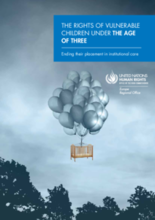Executive summary
This document was commissioned by the Regional Office for Europe of the Office of the United Nations High Commissioner for Human Rights (ROE OHCHR). One of its aims was to stimulate discussion at the Sub-Regional Workshop on the Rights of Vulnerable Children Aged 0 to 3 Years in Prague on 22 November 2011.
It highlights one of the most serious human rights challenges in Europe, namely that many young children, including those under three years of age, continue to be placed in long-term institutional care in many countries in the European Union and across the wider European region. It further provides a normative background from the human rights perspective, drawing above all on the Convention on the Rights of the Child and the Guidelines on the Alternative Care of Children, illustrating the growing emphasis of the relevant human rights framework on overcoming the institutional mode of care for children.
The study extensively reviews available scientific evidence on the negative effects of institutionalization on very young children. It argues that there is now incontrovertible evidence of its harmful effects and that these are not only attributable to poor material conditions in some of the institutions studied, but above all to the lack of emotional attachment and bonding to a particular carer.
The necessary prerequisites for success are listed and analysed, as well as the evidence provided on the prevalence of institutional placement of children under three years of age in the European region. Finally, the document points out some of the contextual, attitudinal and other challenges which have so far prevented the process of de-institutionalization, particularly in countries of Central and Eastern Europe (CEE). It also outlines ways ahead for these (and other) countries to achieve comprehensive transformation of their childcare systems, in line with the development of up-to-date scientific knowledge, international human rights law and practical experience.

